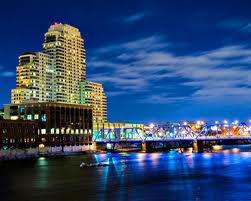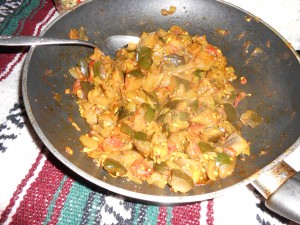Throughout our time in Gujarat we traveled to many cities and villages. But, many of our days were spent in Ahmedabad, the capital. During the days and night that we stayed in Ahmedabad we stayed in the Pride Hotel.
In my other experiences living in “developing” countries, I had always stayed with family or friends. So for me, the Pride Hotel was my first experience staying in a “five-star” hotel outside of the United States—if ever inside the U.S.
The Pride Hotel was an interesting experience. Despite the outside of the building being gated off from the rest of the world—as if it was the U.S.-held “Green Zone” in Baghdad—the facilities were great. The staff was friendly enough, and the spread for the continental breakfast hit the spot. In all, I really enjoyed the hotel and the nights we stayed there. However, I have one complaint: the freakin’ internet!
Don’t get me wrong, I didn’t go to India expecting the world’s fastest internet, and outside of Ahmedabad, I was perfectly content without Wi-Fi—or any technology really. I generally try to be above “first-world problems” like a lack of internet, especially when surrounded by many people who have little to nothing—forget technology. But, the Pride Hotel really tested me. The problem wasn’t that the Pride Hotel didn’t have internet; the problem was that the process of connecting to the internet was like the battle between Indra and Vrta every time I needed it.
We are students of conflict resolution that had traveled to Gujarat to study a long-time conflict, in the hopes of learning how to become practitioners of conflict management and resolution. The irony of the internet situation was as such: we were there to study the negative results of violent conflict, and to do so we needed the internet, but I was constantly about another phone call away from taking my computer down to the lobby and throwing it at the front desk staff.
But, perhaps I should explain. We were told that our group would be given unlimited access to the hotel’s Wi-Fi which they generously offered to us—I’m sure after some strongly worded persuasion on the part of our professor. So, when I heard that we had been given that deal, I thought “that’s pretty cool at least we’ll have some internet when we’re staying here, so we can get some blogging done.” Oh, how naïve I was!
My roommate for the trip RJ Aycock and I were in a constant battle with the front desk to get internet. After a long day of meetings and interviews, one of our typical evenings in the Pride Hotel went as follows:
10:00pm: I attempt to log on to the internet…doesn’t work.
10:02pm: I turn to RJ.
Me: “Hey, is your internet working dude?”
RJ: “Yeah, mines working fine, did you try your last name and room number as the user name and password?”
Me: “yeah, it’s still not working.”
10:03pm: I call the front desk.
Staff member: “This is [insert male/female name here] at the front desk how may I assist you?”
Me: Hi, I’m unable to log on to the internet. I was wondering if I could have some help.
Staff member: Certainly, you’re in room 817 is that correct?
Me: Yes
Staff member: Ok, thank you Mr. Aycock ( which is certainly not my last name, but RJ’s) you just need to enter your room number as the username and your last name as the password. Ok? Enjoy your night, Sir.”
Me: “b..bu..”
Phone clicks….
Me: “[expletive deleted]!!!”
RJ chuckles…
10:05pm: I call the front desk again.
Staff member: “This is [insert male/female name—which is different from the first name—here] at the front desk how may I assist you?”
Me: “Hi, this is OMAR… SALEM in room 817. I’ve been trying to connect to the internet for a while. I’ve entered my room number as the username and my last name as the password, and it’s still not working.”
Staff member: “Ok, try entering your last name in all capital letters and your room number as the user name. Ok? Goodnight, Sir.”
Phone Clicks…
Me: “wa..wait!”
10:07pm: I try entering my last name in all capitals. It doesn’t work.

10:08pm: I call the front desk once more.
Staff member: “This is…”
Me: “yeah, yeah, yeah Hi! I just tried entering my last name in all caps, and the network is still not letting me connect to the internet”
Staff member: “and you put your room number as the user name?”
10:09pm: I imagine ripping the phone out of the wall, going down to the lobby and whipping it around by the cord at them, like a medieval warrior with a mace.
Me: “Yes, I entered my room number as the username!”
Staff member: “Ok, I will get in touch with our IT department, and I will have them call you back shortly.”
10:20pm: I sit waiting for the call…
10:30pm: I sit waiting for the call…
10:31pm: I call the front desk. Talk to them and they inform me that the IT specialist is working on the problem and will call me with the solution shortly.
10:45pm: The phone rings, and I answer.
Me: “Hello?”
IT Specialist: “Hello, this is [insert Indian male name here] from the IT department. You are having trouble connecting to the internet?”
Me: “Yes…”
IT Specialist: “and you entered your room number as the username and your last name as the password?”
Me: “Yes…”
IT Specialist: “did you try entering your last name in all capitals?”
10:46pm: I begin to lose faith in all humanity…and my phone-mace idea begins to seem like an increasingly more attractive option to resolve the situation.
Me: deep exhale… “Yes, I tried that.”
IT Specialist: “Well, try entering the room number as the username and ‘Acock’ as the password, and that should work.”
Me: “Alright, I’m going to try this with you on the phone; don’t go anywhere…”
IT Specialist: “Ok, Sir”
10:47pm: I successfully gain internet access and thank the gentleman for his help.
10:50pm: RJ attempts to use the internet on his computer.
RJ: “Now my internet isn’t working; your computer is connected though right?”
Me: “ha ha ha yeah”
RJ: “[Explitive deleted]!!!”
10: 51pm: RJ picks up the phone with the look of a warrior preparing for battle.









